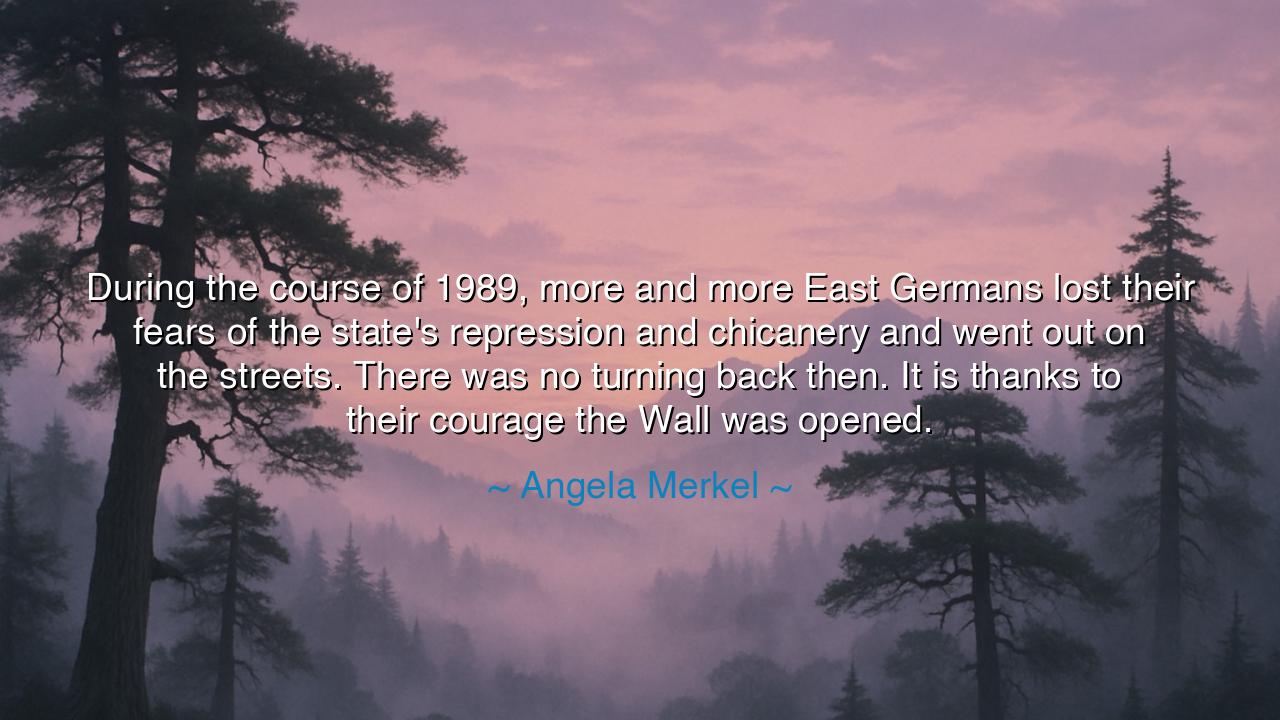
During the course of 1989, more and more East Germans lost their
During the course of 1989, more and more East Germans lost their fears of the state's repression and chicanery and went out on the streets. There was no turning back then. It is thanks to their courage the Wall was opened.






The stateswoman Angela Merkel, herself a daughter of East Germany, once reflected on a turning point in history with these words: “During the course of 1989, more and more East Germans lost their fears of the state's repression and chicanery and went out on the streets. There was no turning back then. It is thanks to their courage the Wall was opened.” In this single remembrance, she captured the essence of all great revolutions — the moment when fear yields to courage, and submission gives way to freedom. It is the story not only of a nation, but of the human spirit itself, which, when awakened by truth, cannot be silenced by tyranny.
To understand the weight of Merkel’s words, one must return to the year 1989, a year of tremors that shook the world. For four decades, the Berlin Wall had stood as a scar upon the earth — a wall of stone and wire that divided not only a city, but an entire people. Behind it lay the shadows of oppression, where the eyes of the state watched every whisper, where trust was fractured, and fear was the daily bread of the ordinary man. Yet even in that darkness, the human heart kept its quiet flame. And when the time came, that flame became a fire. As Merkel recalled, it was not armies, nor kings, nor great powers that brought down the Wall — it was ordinary citizens, armed only with faith and courage, who stepped into the streets and reclaimed their destiny.
In East Germany, to protest was to risk everything. The Stasi, the secret police, held the people in a cage of surveillance and intimidation. Yet one by one, the people’s fear began to crack. In the city of Leipzig, citizens gathered in churches, praying for peace — prayers that turned into chants, chants that became marches, and marches that swelled into a river of defiance. They carried no weapons, only candles and conviction. Each step they took was an act of rebellion against despair itself. It was this collective courage, as Merkel described, that reached a point of no return — a moment when the power of truth outgrew the machinery of lies. And once that moment arrived, no wall, however high or guarded, could stand against it.
Merkel’s words reveal an eternal principle of history: that fear is the first fortress of oppression, and courage the first hammer that breaks it. Every tyrant’s rule depends not on his soldiers, but on the obedience of those he governs. Once that obedience dissolves, his empire crumbles. So it was in 1989, as East Germans, long subdued by repression, found within themselves the courage to act. They discovered what philosophers and prophets had long declared — that freedom is not granted; it is taken by those who refuse to be afraid. When the people rose, the regime fell, and the world watched as a wall of concrete yielded to the invisible power of hope.
The story Merkel tells echoes across all ages. Gandhi stood unarmed before the might of empire, teaching millions that courage rooted in conscience is stronger than any sword. Nelson Mandela, imprisoned for twenty-seven years, emerged not with hatred, but with the strength to forgive, and through that strength, liberated a nation. Likewise, the East Germans who walked the cold streets of Leipzig and Berlin did not fight to destroy, but to be free — and through their moral courage, they changed the course of history. Their triumph was not of violence, but of spirit; not of conquest, but of awakening.
Merkel herself, who grew up under the gaze of East German authority, knew what it meant to live behind that wall — to be taught silence, to feel the weight of unseen eyes. Thus, when she spoke of the people’s courage, it was not as a distant observer, but as one who had tasted that same fear. Her reverence for the citizens who dared to march was born of deep empathy. She understood that true change begins not in parliaments or palaces, but in the hearts of those who refuse to remain silent in the face of injustice. It is their courage — humble, collective, unyielding — that becomes the seed of transformation.
So, my child, take this teaching and let it dwell within you: courage is the weapon of the powerless, and fear the only power of the oppressor. When you face injustice — whether in the world or within yourself — remember those who stood in 1989, unarmed yet undefeated. Do not wait for others to act; every step taken in truth is a step that weakens the walls of deceit. Let your fear become your teacher, and your courage its answer. For as Merkel said, once fear is lost, there is no turning back — and when courage rises in many hearts together, even the walls that divide nations and souls will fall, and freedom will once again find its voice.






AAdministratorAdministrator
Welcome, honored guests. Please leave a comment, we will respond soon